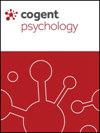心身病人的智力相关态度及便利样本
IF 1.6
Q2 PSYCHOLOGY, MULTIDISCIPLINARY
引用次数: 0
摘要
本文章由计算机程序翻译,如有差异,请以英文原文为准。
Wisdom-related attitudes in psychosomatic patients and in a convenience sample
Abstract Wisdom can be understood as a complex capacity to solve unsolvable problems. Wise persons are better in coping with difficult life situations. People with mental disorders often have problems coping with difficult life situations. This study examines whether a convenience sample from the general population and psychosomatic rehabilitation patients (dis)agree similarly or differently with global sentences representing wisdom-related attitudes. A total of 209 persons from a convenience sample (lecture visitors, M = 32 years of age) and 207 patients with mental disorders (M = 49 years of age) were given a short case vignette of a seemingly unjust situation. They were then asked to which degree they agree to different wisdom-related attitudes (12-WD Scale) regarding the example situation. Results: Patients judged the situation as more unjust, and they identified more strongly with the victim. There were no differences between the two groups concerning agreement to the wisdom ideas, except that the convenience sample was more likely to agree with the wisdom idea change of perspective. This finding of similar wisdom attitudes in patients and others is a validity support for wisdom being a capacity, which may be independent from psychopathology. Wisdom trainings for health promotion potentially do not need to distinguish between patients and general population persons. As the scale asks for wisdom-related attitudes for problem solving, it may be the case that coping with concrete situations (i.e. wise behavior) would be different.
求助全文
通过发布文献求助,成功后即可免费获取论文全文。
去求助
来源期刊

Cogent Psychology
PSYCHOLOGY, MULTIDISCIPLINARY-
CiteScore
2.90
自引率
0.00%
发文量
75
审稿时长
12 weeks
期刊介绍:
One of the largest multidisciplinary open access journals serving the psychology community, Cogent Psychology provides a home for scientifically sound peer-reviewed research. Part of Taylor & Francis / Routledge, the journal provides authors with fast peer review and publication and, through open access publishing, endeavours to help authors share their knowledge with the world. Cogent Psychology particularly encourages interdisciplinary studies and also accepts replication studies and negative results. Cogent Psychology covers a broad range of topics and welcomes submissions in all areas of psychology, ranging from social psychology to neuroscience, and everything in between. Led by Editor-in-Chief Professor Peter Walla of Webster Private University, Austria, and supported by an expert editorial team from institutions across the globe, Cogent Psychology provides our authors with comprehensive and quality peer review. Rather than accepting manuscripts based on their level of importance or impact, editors assess manuscripts objectively, accepting valid, scientific research with sound rigorous methodology. Article-level metrics let the research speak for itself.
 求助内容:
求助内容: 应助结果提醒方式:
应助结果提醒方式:


